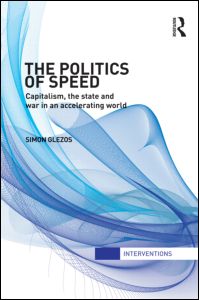Simon Glezos: Embodied Virtuality: Speed, Perception and New Media
@ CPSA 2013This paper really constitutes the introduction to a much larger chapter, which is itself part of a larger research project. The goal of the overall project is to trace out the dynamics of the interaction between speed and politics as they function at the micropolitical level; looking at how individual bodies, minds, perceptions, subjectivities, and collectives are bound up in, and shaped by, accelerating flows in the context of global politics. In this chapter I seek to engage with the radical acceleration of information and communication technologies, and the impact they have on human perception. At stake is the charge levelled by critics such as Paul Virilio that such ICTs constitute a fundamentally disembodying force, capturing and paralyzing human perception. Against this image, I will argue that perception, even technologically mediated perception, is always profoundly embodied, and as such productively engaging with the effects of new ICTs requires would require a mode of analysis that takes seriously their material and corporeal characters. At the end of the paper, I gesture towards what such a mode of analysis would look like, a theory I pursue in the rest of the chapter.
Speed, Perception and Virtuality
Speed not only allows us to get around more easily; it enables us above all to see, to hear, to perceive and thus to conceive the present world more intensely. Tomorrow, it will enable us to act at a distance, beyond the human body's sphere of influence and that of its behavioural ergonomics...
...Doomed to inertia, the interactive being transfers his natural capacities for movement and displacement to probes and scanners which instantaneously inform him about a remote reality, to the detriment of his own faculties of apprehension of the real, after the example of the para- or quadriplegic who can guide by remote control – teleguide – his environment, his abode, which is a model of that home automation, of those 'Smart Houses' that respond to our every whim. Having been first mobile, then motorized, man will thus become motile, deliberately limiting his body's area of influence to a few gestures, a few impulses, like channel surfing.
In the passage above, Paul Virilio describes a central conception of his work, what might be
termed the prostheticizing image of speed. In this image of speed technologies are figured as
prosthetics which, as they are grafted on to the human body, begin to sap its vitality, and slowly hollow it out. From Virilio's perspective the acceleration of transportation and, most importantly, communication technologies paradoxically make us more immobile. Speed technologies turn the (...)
Read full paper in PDF

